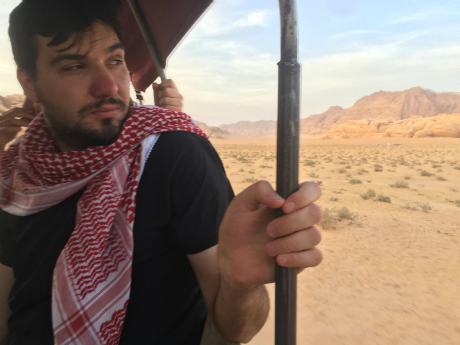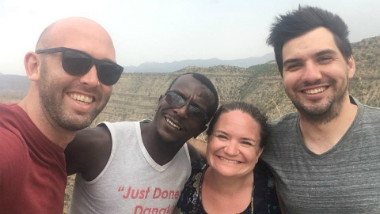
Nate Ferraro ’13 traveling in Wadi Rum, Jordan. “It’s gorgeous!” he says.
Nate Ferraro '13
Asia and Africa
A journey that began in rural Armenia, where Ferraro did economic research for Peace Corps Response, has led this Moravian alum to Somalia and Jordan.
When Nate Ferraro ’13 graduated from Virginia Tech with a master’s degree in applied economics, building on a bachelor’s from Moravian in economic theory and environmental science, he cast about for work. One of his applications landed at Peace Corps Response, which places experienced professionals and individuals with special expertise in short-term assignments in communities around the world. Ferraro, whose only experience outside the United States was a trip to Canada, accepted a position to run an economic research center at a university in rural Armenia.
“I had to learn the Russian alphabet on the fly, because the Armenian alphabet was too difficult,” says Ferraro, who worked with students and peers at the university to examine the effects of tourism on the economy and run a statistical study on trade between Armenia and Turkey. “The work benefited the students and my counterpart there and elevated the status of the university,” says Ferraro. “I loved it. It was an eight-month assignment, but I extended it another seven months. As I reflected on my experience, I realized I like to travel to places very different from where I grew up and that I didn’t want to get a 9-to-5 job. I know how the American story ends.”
“I’ve become very patient with people whose English is not very good.
Once I bought a kilo of cheese because I didn’t know how to ask for half.”
So Ferraro continued his story in Somalia, working for a private consulting firm that serves organizations in need of research. UNICEF, for example, might want an analysis of the needs of children in a specific community. “I would pull research teams together and we’d gather data, clean it, and report it,” explains Ferraro, who was living in the city of Hargeisa in Somaliland, a self-proclaimed but internationally unrecognized republic.
“The Somalis are warm and hospitable, but I lived on a compound with my colleagues, and though we became family, it was isolating. I burned out after a year,” says Ferraro, who visited the REACH office in Hargeisa and followed up on an opportunity to work in Jordan. REACH is a humanitarian initiative that provides information and analysis from crisis-affected populations that help inform decision making regarding aid to those populations.
Though situated in Amman, Ferraro’s work focuses on Yemen— among the most dangerous countries in the world. He researches markets and the costs of consumer goods, creates maps, and performs analyses to help inform humanitarian efforts. Yemen tops the list of countries facing the worst humanitarian disasters in 2020.

Ferraro (right) with friends in Ethiopia.
“It’s great living in Jordan,” says Ferraro. “My Arabic is bad, but everyone speaks a little English, and the amount of falafel I eat would amaze you. I am not, however, normalized to living 60 yards from a minaret where the call to prayer begins at 5:30 in the morning.”
Of course, immersing yourself in what’s not normal is the point. “Going abroad juxtaposes what you are accustomed to with what you encounter. It makes you ask questions,” says Ferraro, who grew up in Norristown, Pennsylvania. In the United States, the pace of life clips along, and the next cool consumer product tugs at desire, he observes—a stark contrast to the slower lifestyle of the places where he has lived over the past few years, where people value time spent with neighbors and in the community.
Then there’s the fierce individualism and independence of Americans. “On certain levels it can lead to a confidence, though at times an irrational confidence,” says Ferraro. “This gives us an edge sometimes, and I love that about the United States. But I’ve lived in communities where all members of an extended family live near one another, and that offers huge advantages. Value systems are different; no system is all good or all bad.”
“When you only know one way of being in the world, it’s easy to fall into the thinking that this is how it is everywhere.”
Reflecting on his presence as an outsider among the people of Armenia, Somalia, and Jordan, Ferraro points out that they feel pride in their homelands but their countries don’t enjoy the lime-light and recognition lavished on the United States. “Having an American living among them who wants to learn about their culture and way of life makes them feel proud. Despite that and my work in these countries, there’s no way I’m giving more than I’m getting.”
What’s next for Ferraro? “I have no idea,” he says. “I am just going to give my 20s away to wherever the world takes me.” He encourages anyone with an adventurous spirit to consider visiting Africa and Asia, remarking that everyone he’s met has been very welcoming.
Read his tips for traveling to a developing country here.
NATE’S NOTES
From Somalia
- Shepherds let their herds of goats roam the cities, and instead of following the animals, they paint their cell phone numbers on the goats’ sides. If you run into a goat with your car, you have to call the owner and pay him. Reimbursement for death or damage to goats was a line item in our budget.
- Somalia leads the world in mobile money and electronic financial transfers.
- Camel meat is delicious.
From Jordan
- Trucks carrying cooking gas roll through the city streets, playing a jingle like the ice cream trucks in the United States. If you need cooking gas, you wave down the driver and make a purchase.
